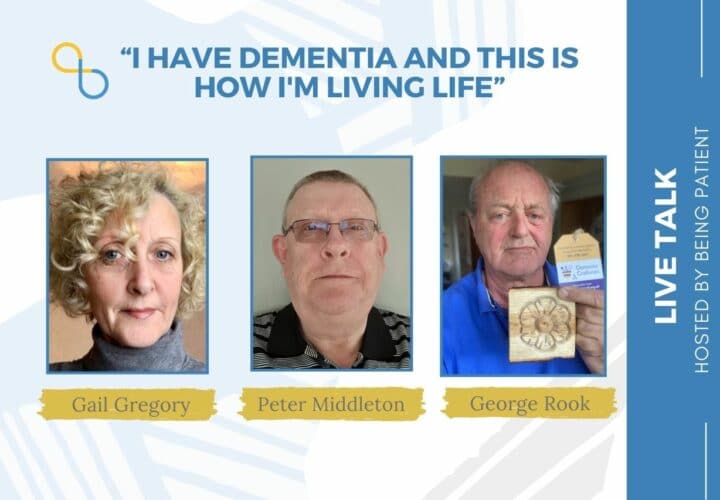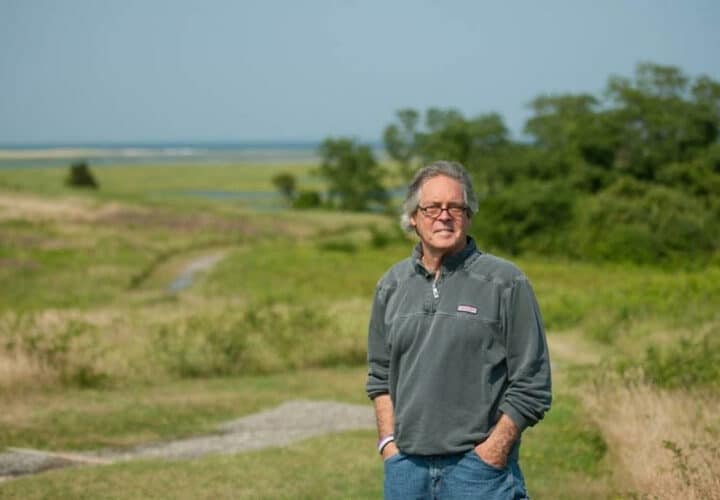The journey to an Alzheimer’s diagnosis can be arduous for people experiencing early symptoms. For Doug and Michele Hall, it meant several trips to see doctors, who repeatedly told Michele, an attorney, that her sudden loss of ability to spell and recognize words was probably just stress. It turned out to be Alzheimer's disease.
Michele Hall, an attorney working in her county sheriff’s office, first noticed that something was off about her cognitive health when she found she suddenly couldn’t fill out a form at a doctor’s appointment. Eventually, she realized she was having trouble spelling and recognizing words. With her husband Doug Hall, she sought consult, and at first, her healthcare providers didn’t spot any signs of dementia on a PET scan. That’s when they told Michele her symptoms were likely brought about by stress, or menopause. But Doug and Michele weren’t so sure. They persisted looking for answers — and ended up seeking a second opinion at the Mayo Clinic. They learned, eventually, that Michelle had Alzheimer’s disease.
In a Being Patient Perspectives live talk, the couple shares their experience of shock in receiving an early-onset diagnosis. They also talked about Michele’s experience with Alzheimer’s drug Aduhelm, the sources of support they’ve found along the way, and how finding others in similar circumstances changed their outlook on living with dementia.
(In February 2024, Biogen took Aduhelm off the market indefinitely.)
- Michele’s first symptoms included difficulty writing, spelling, and recognizing words.
- An initial PET scan came up inconclusive, prompting an initial diagnosis of brain fog due to stress or menopause symptoms — and the search for a second opinion.
- Michele credits the Alzheimer’s Association with making the journey less isolating.
- Michele is on Aduhelm, the controversial drug that is challenging to be prescribed. She and Doug feel lucky that she has the chance to see if it works.
Read on for a transcript of the conversation, or scroll down for a video of the live talk in full.
Being Patient: You were an attorney; you had a pretty demanding job. In hindsight, when were the first signs that something may be wrong?
Michele Hall: I had hurt my hand, and I realized I couldn’t fill out the forms at the doctors office. I couldn’t recognize any words. I couldn’t spell the word ‘cup.’ I tried it for half an hour. None of the words made any sense. It was all a mismatch; it was horrible. I called [Doug, my husband,] crying.
I said to my own brain: What’s going on? You know how to spell! I couldn’t do it; everything stopped me in my tracks. You would think after that, you would go and get some help. But I thought it was something that would go away on its own.
“I said to my own brain: What’s going on?
You know how to spell! I couldn’t do it;
everything stopped me in my tracks.”
For ten years, I was at the sheriff’s office [working as an attorney]. I was working with my team, which was only two people, and they noticed [something was wrong.] Further down, when I would be in meetings, the words would come out as nothing. Everyone still said, this is something that’s a fluke; we’ll figure it out. Everyone took it as ‘Don’t worry, this will be gone soon.’
Doug Hall: We are probably like most people – know someone’s grandparent who had Alzheimer’s and saw the news stories from time to time but really never dug in to really understand it. There were some signs around the house, not crazy signs, but a mistaken ingredient in the recipe or reminding me to take out the trash one too many times.
I think it was probably more pronounced at her job. There was some feedback from her assistants. And for a while, they sort of helped – not cover up but supplement her memory and her scheduling. But after a while, it became apparent that it was too much.
Initially, her doctor said “It’s stress, it’s just stress” and the changing administration and a new sheriff was in town, literally. It was a very stressful work environment. And so they told us to eliminate the stress. So she retired, but it didn’t get any better and didn’t really change.
Being Patient: Misdiagnosis or not being diagnosed is a very common story, especially for someone your age. How did it happen for you? How did you get diagnosed?
MH: We went to a neurologist in our town. He said we’d look at the PET scan, we’d see what it looked like. He actually showed us scan by scan by scan each one. And at the end, he said, “You’re lucky, it’s Christmas. Have a great time. You’re done. There’s no problem at all.” We kept saying, “Are you sure?” He said “Yes, yes, yes.”
DH: She had both an MRI and a psychological evaluation, which showed some deficiencies in a few areas, which led to the recommendation to another neurologist; and had an MRI and a PET scan, and he looked at both of those and said, that there’s no sign of Alzheimer’s or dementia whatsoever in any of these scans. Congratulations. Go back and talk to your doctor about stress and medications and menopause, et cetera.
We decided to get a second opinion. We have a family member who lives in Minnesota, and he said, “Come out to the Mayo Clinic.” We ended up changing our insurance to work with them.
We went to Mayo and met Dr. Day who was outstanding. He looked at the same scans and said, “We can’t see any evidence of any kind of dementia or Alzheimer’s, but sometimes in younger people, because the brain is active, it masks the tests and the scans, and you can’t see it. Let’s just be sure and do a spinal tap.” And so they did a spinal tap, and within the spinal fluid, there were some markers for Alzheimer’s, and they conducted the TAU test, which showed that she had the markers and indications that she was positive for Alzheimer’s disease.
Being Patient: Nobody wants an Alzheimer’s diagnosis, and it’s probably one of the hardest things in the world that has ever happened to both of you. In hindsight, what would have made those conversations better for you?
MH: I don’t know. There was no way to sugarcoat it. They had to tell me the bad news and then just everybody kept saying “Don’t worry.”
Yeah, well, no, there’s a reason to worry. Mayo has just implemented a psychiatrist to help with some of that transition, and I’m glad they’re finally doing that.
DH: It was a rough couple of days because first, you know, it’s only me, and like, how do I tell her? What about the kids? And, just, it’s a lot.
I like their approach now with getting a social worker psychiatrist involved. If that was early in the process, if we’d gotten hooked up with the Alzheimer’s Association earlier, that probably would have helped, but I don’t think there’s a lot of buffer for just that life-altering shock.
“It was a rough couple of days because first,
you know, it’s only me, and like, how do I tell her?
What about the kids? And, just, it’s a lot.”
Being Patient: Michele, you said that meeting other people who were on this journey is what really saved you. Tell us a little bit about that. The Alzheimer’s Association connected you with other people in your area. So what did that mean to you? What did it look like to sit down and talk to someone who was already diagnosed about their experience?
MH: Well, they have the experience, first of all. They know all the ups and downs. For instance, when we first met Kelly, and her husband, she said, “You have to take a nap in the morning. Or in the afternoon.”
She said one or the other. You must do this. And I was like, I’m not the napper. Oh, it changed my whole life, made everything better. They have the knowledge, and they’re wonderful, and now we have done it for other people.
My advocacy started with Alzheimer’s Association people. They were fabulous. They’ve done it with a lot of people; they start with “Oh can you just write down some of your information?” They’re good. They’re sneaky about it.
They get you in little by little, and then you realize that you’re going to go talk to somebody or you’re going to go to get more information. The Alzheimer’s Association is amazing. I would do anything for them. And I don’t have the language skills, which is why I usually like to have him by me, but I’m getting better. I think that being able to make other people feel good, that they’re not the only ones.
Being Patient: You guys are really well-informed on Aduhelm. These Mab drugs, which are monoclonal antibody drugs, work to break up the plaque in the brain. But what we don’t know is, does that stop Alzheimer’s? Since you started this drug, have you noticed a change?
MH: Everybody has asked me that, of course, and I don’t see a change. But for now, I’m good. The only thing I had was I had a really hard headache, is what I’d call it. And that was a symptom that I forgot, or else I would have taken Tylenol or something. But otherwise, I’ve had no problems. I’m there once a month, and I just watch TV, whatever TV is on, and then we go home, and it’s not a bad situation right now.
DH: She’s at eight doses. Her ninth dose is Tuesday, and it’s once a month. An IV and it takes about an hour and a half. And they tiered it up, so the first two doses were just 10 percent of a full dose. Three and four were 30 percent. Five and six were 70 percent, and [doses] seven and eight are 100 percent. So number nine will be 100 percent as well. So she’s only on her third full dose. You know, unfortunately, as we all know, for Alzheimer’s, there’s not a very specific test.
The very interesting thing is she had a PET scan with contrast when she was up there, and we’re gonna get those results in the next month or so, and we’re going to compare that to her scan of a year ago and see if there’s a difference in the plaque which would be very, very interesting.
We’re looking forward to seeing that. We’re hopeful that it helps in some way, shape, or form. We’re monitoring the news, talking to our doctors on a regular basis, and hopefully, it’s sort of like the cycle of AIDS drugs: every next generation is a small step forward to the point where most people with HIV don’t get AIDS anymore. We’re hoping to follow that same path. Right now, we’re on the original, crazy, expensive cocktail that nobody knows what’s in it, how it’s gonna work, and it’s so expensive, and nobody wants to cover it.
We couldn’t be more disappointed and upset with the CMS decision because here’s something that could be really helpful to six and a half or maybe 2 million of the six and a half million people that have Alzheimer’s. The FDA, the medical arm approved it, and then money people, CMS, says, “Oh, we’re not going to pay for it,” which is very unusual and not how the process usually goes. There are millions of people that should potentially have access to this drug that don’t, so we were lucky because we got in immediately. We couldn’t disagree more with that decision. We think it’s really robbing a lot of people of their chance to see if this drug, the only one that’s available now, could help them. I feel strongly about it.
Being Patient: Michele, from your perspective, you’ve now been traveling on this journey for a couple of years now, since you’ve had your diagnosis. Tell us a little bit about your outlook on life today.
MH: Well, my outlook on life is good. I got very lucky because what happened to me left me pretty much with what I would like to be doing anyway. I like to run in the preserve. Now if somebody works somewhere, and now she can’t, you can’t do what you’re supposed to do. That’s a different thing, but for me, Doug’s here. I have a partner to help me. And it’s just not that bad yet. I have to put that yet when I talk to people. People all the time, say “Oh, I thought you had this disease, but you’re fine.” And I am fine, right now.
This interview has been edited for length and clarity. Watch the full interview with Michele and Doug Hall on our YouTube here.
UPDATE: 3 March 2024, 9:27 P.M. ET. In February 2024, Biogen took Aduhelm off the market, citing financial concerns. Although the drug did receive accelerated, conditional FDA approval for the treatment of early Alzheimer’s disease in 2021, it is no longer available to new patients. The company announced it would sunset trials in May 2024 and cease supplying the drug to current patients in November 2024.




I have ALZ. i knew i had it, i took care of my mom. I found a research program and after 5 years I am still okay, little changes I wish i had someone else to talk to about what i am going through. I don’t know anyone to talk to as they don’t have it.